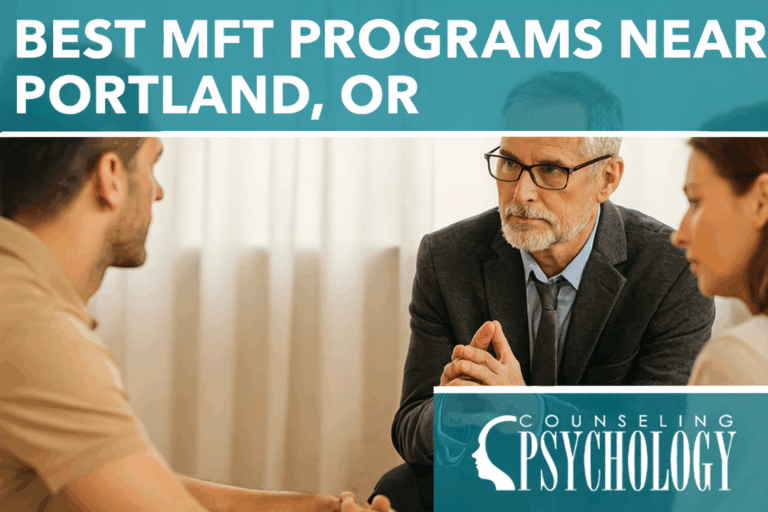Best MFT Programs Near Portland, OR

Marriage and family therapists (MFTs) are in high demand throughout Portland and the broader Willamette Valley. Whether you want to pursue a master's degree, add a graduate certificate to your portfolio, or advance into doctoral-level MFT training, the Portland metro area offers a strong mix of programs that blend systems-based coursework, hands-on clinical training, and community-engaged practice.
In this article, you'll learn:
- What types of MFT degrees and certificates are available near Portland
- Local examples of clinical training environments and practicum/internship settings
- Key Oregon LMFT licensure requirements
- Typical formats, credit loads, and tuition ranges across MFT program types
- Regional employment settings for new MFT graduates
2026 Best MFT Programs Near Portland, OR
Lewis & Clark College
Portland, OR - Private 4-year - lclark.edu
Graduate Certificate - Master of Arts in Marriage, Couple, and Family Therapy (Addictions treatment)
Campus Based - Visit Website
Lewis & Clark College's Master of Arts in Marriage, Couple, and Family Therapy offers a specialized addictions treatment concentration within its 60-credit curriculum. This campus-based program emphasizes social justice and strength-based therapeutic approaches while preparing students for LMFT licensure. The cohort learning model includes a clinical internship and can be completed in three years full-time or four years part-time. No entrance exam is required for admission to this graduate-level program, which focuses on developing advanced skills for working with diverse populations in addiction treatment settings.
- 60 semester credit hours
- Full-time: 3 years
- Part-time: 4 years
- Fall semester start
- Cohort learning model
- Social justice perspective
- Clinical internship included
- Multiple therapy concentrations
- Prepares for LMFT licensure
- Strength-based therapeutic approach
George Fox University
Newberg, OR - Private 4-year - georgefox.edu
Master's - Marriage, Couple and Family Counseling
Online & Campus Based - Visit Website
George Fox University's Master's in Marriage, Couple and Family Counseling prepares students for dual licensure as LPC and LMFT through a 64-credit hybrid program combining online coursework with in-person components. This CACREP-accredited curriculum emphasizes systemic therapy perspectives and integrates spiritual understanding, supported by a 700-hour clinical internship. Flexible scheduling includes day, evening, and weekend classes, with total tuition at $51,328. The program requires an entrance exam for admission. Graduates benefit from strong employment prospects, with a projected 16% job growth in the field.
- 2-4 year program length
- Dual licensure (LPC/LMFT)
- 64 semester credit hours
- Online and in-person tracks
- CACREP accredited
- 700-hour clinical internship
- $51,328 total tuition
- Day, evening, weekend classes
- Spiritual integration approach
- 16% job growth projection
Portland State University
Portland, OR - Public 4-Year - pdx.edu
Master's - Marriage, Couple, and Family Counseling
Online & Campus Based - Visit Website
Portland State University's Marriage, Couple, and Family Counseling Master's program delivers comprehensive three-year professional training through a hybrid cohort model with in-person classes in downtown Portland. This CACREP-accredited program requires 90 credits and prepares graduates for dual licensure as LPCs and LMFTs, with estimated resident costs of $54,020. Students gain hands-on clinical experience at the Community Counseling Clinic and complete 20-30 hour weekly internships with established partner organizations. Evening class schedules accommodate working professionals. The program does not require entrance exams for admission, focusing instead on practical training and community engagement for diverse counseling careers.
- Three-year cohort-based program
- 90 total credit hours
- Resident cost: $54,020
- In-person downtown Portland
- Community Counseling Clinic experience
- Licensure preparation: LPC/LMFT
- Evening class schedules
- 20-30 hour weekly internships
- CACREP accredited program
- Multiple internship partner sites
Western Seminary
Portland, OR - Private 4-year - westernseminary.edu
Master's - Master of Arts in Marital and Family Therapy
Campus Based - Visit Website
Western Seminary's Master of Arts in Marital and Family Therapy is a 73-credit campus program integrating Christian worldview with psychological training for mental health and ministry careers. The curriculum emphasizes clinical skills development through 325 practicum hours and flexible evening/weekend classes, accommodating working professionals. Graduates are prepared for state licensure with a minimum 3.0 GPA requirement and accredited baccalaureate prerequisite. This master's program does not require an entrance exam, focusing on ethical training and diverse clinical environments.
- 73-credit Master of Arts degree
- Christian worldview integration
- Prepares for state licensure
- Flexible evening/weekend classes
- Minimum 3.0 GPA requirement
- 325 practicum clinical hours
- Accredited baccalaureate prerequisite
- Multiple specialization tracks
- Professional ethics training
- Personal counseling requirement
Master's - Master of Arts in Counseling: Marriage, Couple, and Family Counseling
Campus Based - Visit Website
Western Seminary's Master of Arts in Counseling with a Marriage, Couple, and Family Counseling concentration offers a 71-credit campus program blending biblical foundations with advanced counseling techniques. Students complete 700 clinical hours, including 280 direct client contact hours, through practicum and four internship semesters. With a 12:1 student-faculty ratio and weeknight/Saturday schedules, it prepares for licensure without an entrance exam requirement. The integrative approach ensures readiness for professional roles in various mental health settings.
- 71-credit Master's degree program
- Christian worldview integration
- 700 total clinical hours required
- 280 direct client contact hours
- Weeknight/Saturday class schedules
- Practicum and four internship semesters
- Licensure preparation
- 12:1 student-faculty ratio
- Multiple specialization options
Why Consider an MFT Program in the Portland Region?
Portland is home to a robust behavioral health ecosystem with strong demand for relational, couples, and family therapists. Students can complete clinical experiences and practicum hours in a range of settings, including:
- County mental health programs (Multnomah, Washington, Clackamas)
- Large health systems, such as Providence Behavioral Health and Legacy Health
- Community mental health organizations, including Cascadia Health
- Youth and family agencies, such as Morrison Child & Family Services
- Nonprofit service providers, including Outside In and Central City Concern
- Private practice groups in neighborhoods like Hawthorne, Sellwood, Beaverton, and Hillsboro
Students also benefit from Portland's emphasis on trauma-informed care, LGBTQ+ affirming practice, integrated behavioral health, and community wellness, making it an ideal training environment for aspiring MFTs.
Learn more about MFT Programs in Oregon.
Types of MFT Programs Available Near Portland, OR
Below is an overview of MFT program options commonly available to students in the Portland region, including degree pathways, formats, admissions expectations, and career applications.
Master's-Level MFT Programs
A master's in Marriage and Family Therapy is the standard degree required for LMFT licensure in Oregon. These programs typically include systems theory coursework, couples counseling, family therapy interventions, ethics, diagnosis, and supervised clinical training.
Common Master's Program Features
| Feature | Typical Range/Structure |
| Credits | ~60–72 credits (or 80–90 quarter credits) |
| Format | Campus, hybrid, or limited online coursework |
| Clinical Hours | ~500–700+ supervised hours |
| Time to Completion | 2–3 years full-time; 3–4 years part-time |
| Tuition | Varies; private universities generally higher than public |
| Outcome | Eligibility toward LMFT licensure in Oregon |
What Master's Students Typically Learn
- Foundational and advanced family systems theories
- Couples therapy modalities (EFT, Gottman, solution-focused approaches)
- Family-of-origin work and intergenerational models
- Child and adolescent therapy
- Psychopathology and diagnosis
- Cultural humility and equity-informed practice
- Ethics and legal responsibilities for MFTs in Oregon
Examples of Possible Master's Clinical Sites in the Region
While programs coordinate specific placements, students commonly train in:
- Community mental health clinics (e.g., Cascadia Health)
- Youth/family agencies (e.g., Morrison Child & Family Services)
- Medical settings with integrated behavioral health (e.g., Providence Medical Group)
- School-based counseling programs in Portland Public Schools
- Private practice groups in Portland, Gresham, Beaverton, or Hillsboro
Graduate Certificate Options
Graduate certificates in MFT (or closely related areas, such as systems-based therapy or couples therapy) are typically designed for:
- Licensed or pre-licensed mental health clinicians seeking additional MFT competencies
- Counselors pursuing additional coursework to work more effectively with couples and families
- Students preparing for advanced training or doctoral work
Common Graduate Certificate Features
| Feature | Typical Range/Structure |
| Length | 12–24 credits |
| Format | Often hybrid or part-time |
| Target Audience | Current professionals or graduate students |
| Outcome | Additional specialized training; may support certain licensure competencies |
What Students Typically Learn in MFT Certificates
- Couples and family counseling interventions
- Trauma-informed family therapy
- Working with blended families, foster care, or high-conflict family systems
- Cultural and community contexts of family healing
Where Certificate Students Often Complete Hours
Although not all certificates require clinical hours, those that do often utilize settings such as:
- Outpatient clinics
- School-based family services
- Marriage and couples counseling centers
Doctoral-Level MFT Training
Doctoral programs in Marriage and Family Therapy, or counseling psychology and human development programs with MFT emphasis areas, prepare clinicians for roles in:
- Advanced clinical supervision
- Teaching in universities
- Research in family systems and relational health
- Leadership within behavioral health organizations
Common Doctoral Program Features
| Feature | Typical Range/Structure |
| Credits | ~60–90 beyond the master's |
| Format | Campus-based or hybrid |
| Time to Completion | 3–5 years |
| Clinical Requirements | Advanced practicum + supervision training |
| Outcome | Advanced clinical or academic career pathways |
What Doctoral Programs Typically Emphasize
- Family systems research methods
- Advanced couples and family therapy models
- Diversity, equity, and social-justice frameworks
- Clinical supervision training
- Teaching and academic scholarship
Doctoral-Level Training Sites in the Region
Doctoral trainees often work with:
- University-based clinics
- Research-oriented family therapy labs
- Advanced placements at integrated health centers
- Community mental health agencies with leadership-focused roles
Oregon LMFT Licensure Overview
To become a Licensed Marriage and Family Therapist (LMFT) in Oregon, candidates must meet requirements set by the Oregon Board of Licensed Professional Counselors & Therapists (OBLPCT).
General Requirements Include:
- A qualifying master's or doctoral degree with an MFT emphasis
- Specific coursework in family systems, assessment, ethics, and diagnosis
- 2,000+ post-degree supervised hours, including at least 1,000 direct client hours
- Passing the national AMFTRB exam
- State background check and application process
Coursework Notes
Most Portland-area MFT programs intentionally align their curriculum with Oregon's licensure requirements, including:
- Family studies
- Couples interventions
- Ethics and professional issues
- Psychopathology
- Individual and family assessment
- Multicultural counseling
- Human development
Career Outlook for MFTs in the Portland Metro Area
Portland's commitment to mental health access means strong job opportunities for LMFTs across the region. Common employers include:
- Community mental health agencies (Cascadia Health, LifeWorks NW)
- Hospitals and integrated health systems (Providence, Legacy Health)
- Youth and family organizations (Morrison Child & Family Services)
- Nonprofits serving underserved populations (Outside In, Central City Concern)
- School-based counseling programs
- Private practices, particularly those specializing in couples therapy, trauma, or LGBTQ+ services
Typical LMFT Roles
- Marriage and Family Therapist
- Couples Therapist
- Adolescent/Youth Therapist
- School-Based Family Therapist
- Behavioral Health Provider in medical settings
- Clinical Supervisor (with experience and advanced training)
Portland-Specific Trends
- High demand for trauma-informed couples therapy
- Growth of integrated behavioral health within primary care
- Strong need for therapists specializing in youth, LGBTQ+ families, and blended families
- Expansion of mental health nonprofits serving Medicaid populations
Tuition, Format, and Scheduling Comparison
| Feature | Master's | Graduate Certificate | Doctoral |
| Typical Credits | 60–72 | 12–24 | 60–90 beyond master's |
| Common Format | Campus or hybrid | Hybrid/part-time | Campus or hybrid |
| Clinical Hours | Required (500–700+) | Varies | Required (advanced-level) |
| Typical Completion Time | 2–3 years | 6–12 months | 3–5 years |
| Ideal For | Future LMFTs | Working clinicians adding skills | Supervisors, educators, researchers |
FAQs
Q: Can I complete an MFT program fully online if I live in Portland?
A: Some programs near Portland offer hybrid or partially online coursework, but fully online COAMFTE-style options are more limited in the region. Many local programs require significant in-person clinical training within Portland-area clinics or hospitals.
Q: What are common clinical training settings for MFT students in Portland?
A: Students often train in community mental health organizations (e.g., Cascadia Health), youth and family agencies (e.g., Morrison Child & Family Services), outpatient clinics, private practice groups, and integrated behavioral health departments at local medical centers.
Q: Is an MFT degree different from an LPC degree in Oregon?
A: Yes. MFT programs are systems-based and emphasize couples and family therapy. LPC programs focus more on individual counseling. Some programs in Oregon are designed to meet requirements for both licensure pathways, but this varies; students should check each curriculum closely.



